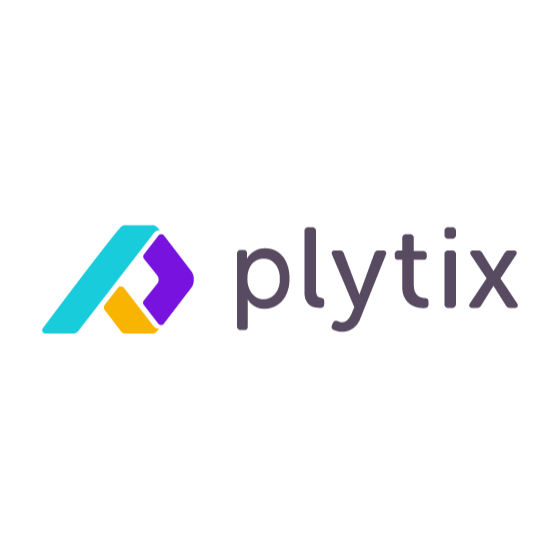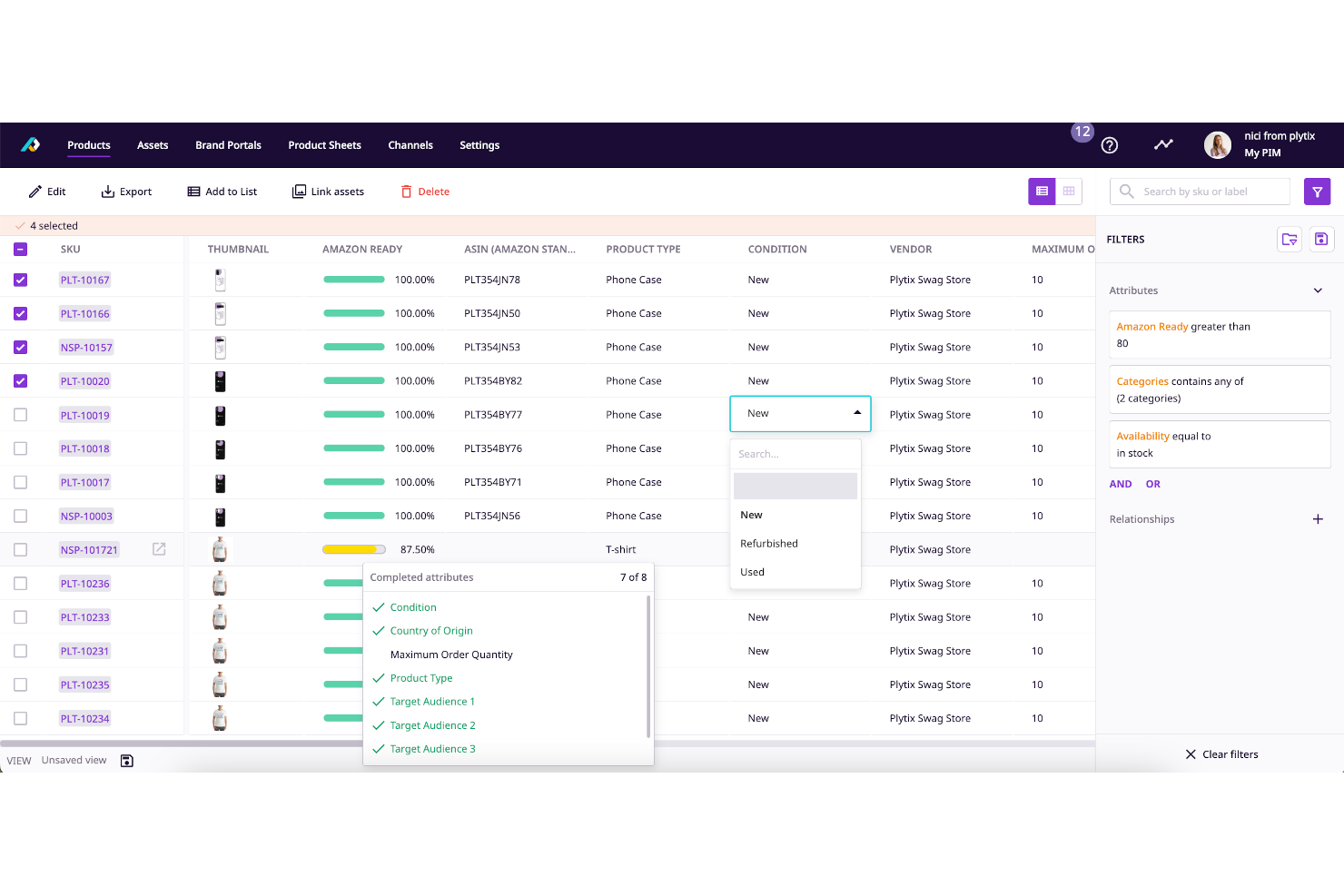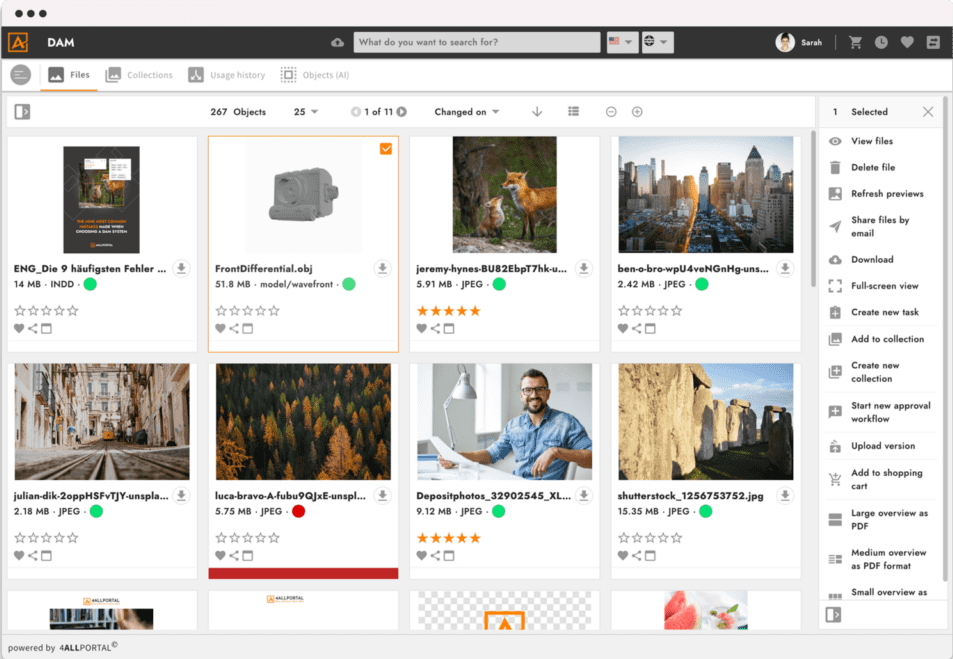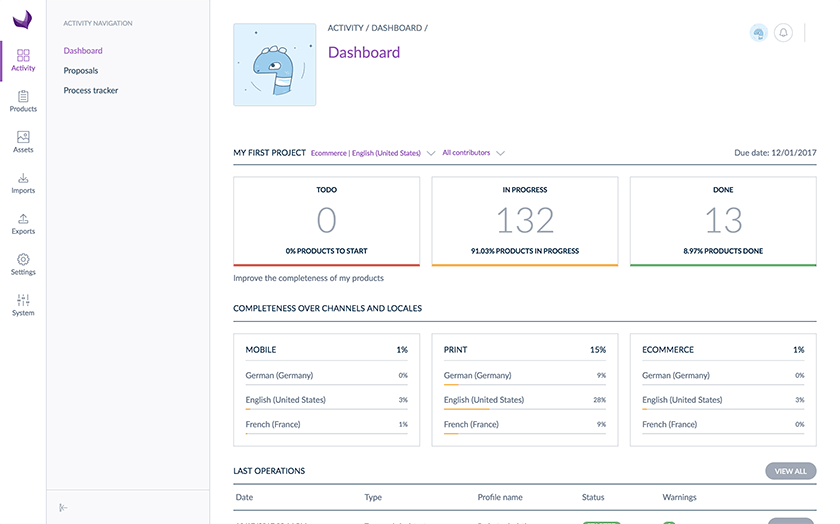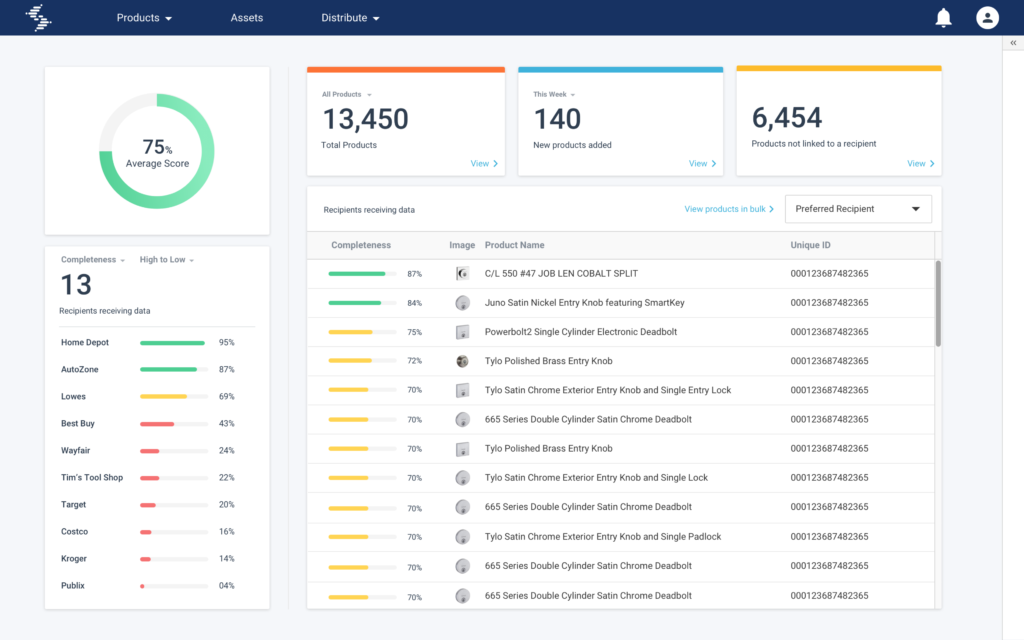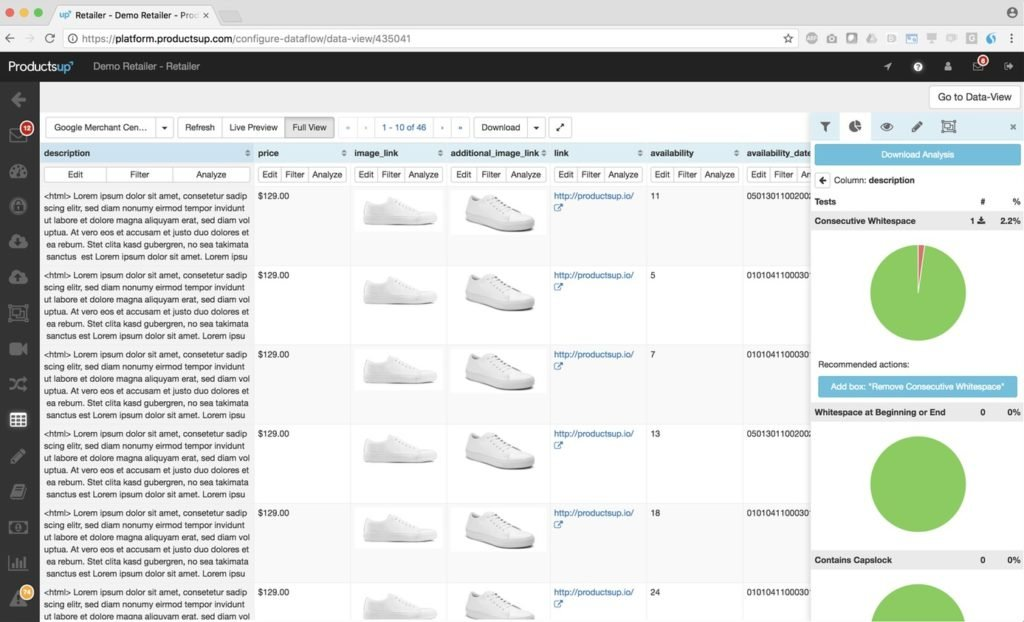10 Best PIM Software Shortlist
Here's my pick of the 10 best software from the 30 tools reviewed.
Our one-on-one guidance will help you find the perfect fit.
There are so many different PIM software solutions, so making a shortlist of the best can be tricky. You want a single repository for all product-related information, facilitating the efficient organization, updating, and distribution of this data across various sales and marketing channels—and now need the right tool for your online commerce business. I've got you covered! In this post, I share from my personal experience managing online stores of all sizes , using many different product information platforms, and share my picks of the best PIM software overall.
Why Trust Our Reviews
We’ve been testing and reviewing ecommerce software since 2018. As ecommerce managers ourselves, we know how critical, and difficult it is to make the right decision when selecting software.
We invest in deep research to help our audience make better software purchasing decisions. We’ve tested more than 2,000 tools for different ecommerce use cases and written over 1,000 comprehensive software reviews. Learn how we stay transparent & our software review methodology.
The Best PIM Software Comparison Chart
Here is a convenient table where you can compare the tools we just covered side by side. We also have more options you can consider at the end of this chart.
| Tools | Price | |
|---|---|---|
| Plytix | From $450/month | Website |
| 4ALLPORTAL | Pricing upon request | Website |
| OneTimePIM | From $1,050/month (900 GBP) | Website |
| Acquia DAM (Widen) | Pricing available upon request | Website |
| Akeneo PIM | From $25,000/year | Website |
| Syndigo | Pricing available upon request | Website |
| Pimcore | Pricing upon request | Website |
| inRiver | Pricing upon request | Website |
| PIMworks | Pricing upon request | Website |
| Productsup | Pricing upon request | Website |

Compare Software Specs Side by Side
Use our comparison chart to review and evaluate software specs side-by-side.
Compare SoftwareHow to Choose PIM software
With so many different PIM software solutions available, it can be challenging to make decisions on what PIM software is going to be the best fit for your needs.
As you're shortlisting, trialing, and selecting PIM software, consider the following:
- What problem are you trying to solve - Start by identifying the product information management feature gap you're trying to fill to clarify the features and functionality the PIM software needs to provide.
- Who will need to use it - To evaluate cost and requirements, consider who'll be using the software and how many licenses you'll need. You'll need to evaluate if it'll just be the ecommerce team, or the whole organization that will require access. When that's clear, it's worth considering if you're prioritizing ease of use for all, or speed for your ecommerce software power users.
- What other tools it needs to work with - Clarify what tools you're replacing, what tools are staying, and the tools you'll need to integrate with, such as accounting, CRM or HR software. You'll need to decide if the tools will need to integrate together, or alternatively, if you can replace multiple tools with one consolidated PIM software.
- What outcomes are important - Consider the result that the software needs to deliver to be considered a success. Consider what capability you want to gain, or what you want to improve, and how you will be measuring success. For example, an outcome could be the ability to get greater visibility into performance. You could compare PIM software features until you’re blue in the face but if you aren’t thinking about the outcomes you want to drive, you could be wasting a lot of valuable time.
- How it would work within your organization - Consider the software selection alongside your workflows and delivery methodology. Evaluate what's working well, and the areas that are causing issues that need to be addressed. Remember every business is different — don’t assume that because a tool is popular that it'll work in your organization.
Best PIM Software Reviews
Here’s a brief description of each PIM tool that is featured on this list.
Plytix is a cloud-based product information management (PIM) system designed for businesses engaged in omnichannel marketing.
Why I picked Plytix: This software offers both product information management and digital asset management (DAM) functionality. Ecommerce businesses can create a centralized repository for product information and digital assets in the platform, allowing users to to enrich their product data with media files like videos and images, as well as pricing information, product specs, and additional descriptions. Multiple pricing tiers are available, making it a good option for small and medium-sized businesses.
One of the software’s main functions is to automate data processes and the creation of product feeds that automatically populate with product data, formatted according to the requirements of different channels. With these feeds, users can publish product information across multiple sales channels, which include social media platforms, marketplaces, and ecommerce websites.
Plytix Standout Features & Integrations
Key features include computed attributes for editing product information with formulas, meaning it can popular more data with less input. This can be a huge time saver for small teams who want to duplicate certain information changes across a variety of listings at once. It also offers product completion tracking, which is a system workflow that manages new products as they move through different content creation channels in preparation for launch. It will flag those that are missing information or lagging behind in the development process.
Integrations natively include Shopify, with additional integrations configured using the software's open API.
4ALLPORTAL is a digital asset management (DAM) and product information management (PIM) software system tailored for companies and retailers in need of a scalable solution for streamlining workflows around product data and file management.
Why I picked 4ALLPORTAL: Its PIM system serves as a single point of access for all sales and marketing-related product information. The system works to combine all product data from different third-party systems and then provides optimal provisioning, management, compliance, and search functionality.
4ALLPORTAL’s biggest appeal to businesses is the scalability of its PIM system. It offers a variety of connectors and modules that deliver software customizability. With the master data management feature, they can easily manage all types of data, including address data, product data, and their specific assets. The PIM system can be deployed on-premise or in the cloud.
4ALLPORTAL Standout Features & Integrations
Key features include integration with your enterprise resource management (ERP) system. This means pulling data from platforms like NetSuite, SAP, Oracle, or Microsoft to better populate your product profiles. This is a two-way communication pathway, meaning changes in the ERP are reflected in 4ALLPORTAL and vice versa. They also have a focus on self-service marketing materials, such as direct access to download or print business cards, ads, and product packaging.
Integrations include the Adobe Creative Suite, Drupal, Azure AD, Dropbox, Jira, Magento, Slack, diverse social media platforms, and thousands more available through Zapier.
OneTimePIM is a SaaS PIM solution with a fully integrated digital asset management system and an automatic datasheets feature. It allows companies to aggregate all their product data into a single platform.
Why I picked OneTimePIM: It differs from other PIM companies as they offer onboarding services at no additional cost. This means that they will devote as much time as necessary to help your business set up the PIM, clean and import the data, and set up any integrations.
OneTimePIM comes with custom-built e-commerce connectors that operate directly from within the PIM, giving you full transparency and reporting on the product data you send to your website. Simply map the PIM attributes to the e-commerce store and click run, or schedule it, to update your website instantly. These are genuine purpose-built connectors and are the best in the PIM industry. OneTimePIM can also integrate with other systems like your ERP.
OneTimePIM Standout Features & Integrations
Key features worth noting include their custom datasheet creation tool. This tool is designed to help you update product information and then quickly transform it into a pamphlet or catalog with a drag-and-drop interface that makes design easy. Datasheets also update dynamically, adding and subtracting information in real-time according to your product information spreadsheets. OneTimePIM offers multiple templates and customization options for datasheet creation.
Integrations include Shopify, Magento, WooCommerce, and ERP systems.
Acquia DAM (Widen) is a product information management software that serves as a central foundation to organize, share, and distribute your brand assets and product content across the web.
Why I picked Acquia DAM: I really liked the flexible metadata models. And in addition to using metadata to classify your assets, you can also assign different roles and permissions to different user groups to control access levels.
It's worth mentioning that you can use this tool as a standalone digital asset management tool or build it out into a larger management system. In addition to the core DAM offering, several add-on applications are available to construct your brand management, marketing resource management, or product information management system. For example, you can use Entries to assemble product content for e-commerce distribution, or Portals to share curated collections within branded webpages. You could also leverage Templates to build localized ads and brochures or use their Workflow add-on to manage work-in-process review and approval.
Acquia DAM Standout Features & Integrations
Features include hi-res previews, version control, asset history, predictive search, metadata keyword search, content syndication, channel portals, and time-based access to assets.
Integrations include Airtable, Clarifai, Asana, Box, Salesforce, OneDrive, Slack, Wrike, and Shutterstock. You can also find partner integrations from Adobe Creative Cloud, Enwove, Hootsuite, Modus, and Mediafly.
Acquia DAM has plans for standard and enterprise DAM solutions and a DAM+PIM offering.
Akeneo is an omnichannel commerce solution that caters to collaborative product teams who want to divide and conquer data entry with consistency and quality.
Why I picked Akeneo: It is PIM software-meets-project management, incorporating both data quantity and quality measurements as well as collaboration and teamwork assistance. The UI is sleek and intuitive, making it easy for users to bounce between product information, DAM, and task management. The progress tracking dashboard will quickly show you which products are WIP.
Akeneo does a lot well, but its services are limited when it comes to solutions for product substitutions, product cross-referencing, upselling, and cross-selling opportunities. Additionally, the product variant modeling is the only part of the UI that stands out as not being very user-friendly, requiring complicated importing and exporting of base product templates.
Akeneo Standout Features & Integrations
Key features include a multi-user approach to PIM, including advanced permissions and a Teamwork Assistant that empowers you to securely oversee user management through precise definitions of roles, tasks, and access levels for each individual. This way, even expansive teams can focus within a secure and customizable workspace tailored to their specific needs, ensuring they can concentrate solely on the essential products for their role.
Integrations include 100+ popular platforms like Adobe Magento, Salesforce Commerce Cloud, Google Shopping, Spryker, PrestaShop, OroCommerce, ShopifyPlus, and more. Akeneo also integrates with your tool stack using rich REST and Events APIs.
Syndigo is a content experience hub (CXH) that unites manufacturers, suppliers, distributors, and retailer recipients to optimize PIM solutions.
Why I picked Syndigo: It boasts over 250K available product attributes for hyper-detailed product differentiation. Additionally, the tool is designed to parse said data and offer optimization feedback and product status alerts.
The software is also designed to monitor all product content to provide improvement alerts, actionable customer insights, business-critical product KPIs, and vendor health scores for incorrect or missing product information.
Syndigo has a pay-per-SKU service subscription model, meaning that companies with larger product databases may be eventually priced out. Bulk editing product information can also be tricky, as larger volumes of data may prevent the page from auto-generating records. A workaround for this is to download an Excel file, make batch changes, and then re-upload.
Syndigo Standout Features & Integrations
Features include master data management, analytics, internal data governance, effective content delivery, plus performance feedback and optimization
Integrations include storefronts for 1,500+ retailers globally including Walmart, Costco, FreshDirect, Amazon, and Instacart.
Pimcore is a data and experience management platform for any digital data and customer experience. Its Product Information Management product is available in cloud, enterprise, and community editions.
Why I picked Pimcore: The community edition of Pimcore is open source and entirely free to use forever. A free plan will net you an open source GPLv3 software license with publicly accessible source code. For IP protection (private source code), you can upgrade to either the enterprise or unlimited plan. The free Pimcore plan comes with PIM/MDM/CDP/DAM; DXP/CMS/commerce; and unlimited entities, data, and users.
Pimcore’s current DAM asset portal extension is not compatible with mobile devices so you won’t find reliable compatibility with iOS or Android smartphones. Highly collaborative teams will also find that there is no way to track who is making edits to product data in real-time, which may result in accidentally overriding simultaneous changes.
Pimcore Standout Features & Integrations
Key features include an enterprise-grade translation system so you can quickly produce product content in ## different languages. While their system has a limited number of available languages by default, developers can build their own translation engines by adding a Symfony translation file for the desired language into the default path for the Symfony translator. If that was IT jibberish to you, we're in the same boat. But what that boils down to is with a bit of IT help, you can customize the translation system to suit your unique localization needs.
Integrations include 1600 pre-integrated marketing, shopping, retail, and business channels as well as simple Microsoft Excel connectivity through the import and export of CSV and XLSX spreadsheets. They provide a standard API, a full-featured REST Webservice API, and a Data Hub GraphQL API for additional two-way connection opportunities.
InRiver is a digital-first PIM solution that’s designed to drive revenue and collects everything marketing text, images, videos, specifications, 3-D drawings, instruction manuals, and more with support in all 258 ISO languages.
Why I picked InRiver: You can leverage smart image recognition technology to help auto-populate attributes like colors, descriptions, and tagging.
InRiver offers a robust self-service portal for resellers where you can control what data these unique users have access to for searching and downloading. InRiver actually supports multiple means of collaboration, including built-in Gantt chart functionality for campaign timelines.
A downside of InRiver is that it lacks digital asset management (DAM) organizational functions. It does have the capacity to handle your assets through integration, but it requires investing that extra time (and money) to do it.
InRiver Standout Features & Integrations
Key features include their digital shelf analytics (DSA) solutions. They offer two: Channel Insights and Evaluate. Together, these are designed to monitor how your selected SKUs are performing against those of your competitors. They can also evaluate your syndication strategy and assess the viability of new ecommerce channels. You can also gauge how your product stories impact product ratings, ranking, and conversions. Channel Insights offers high-level DSA capabilities but is included as a freemium add-on.
Integrations include 1WorldSync, Adobe, Amla Commerce, Apptus, Aprimo, Blosm, Boarding, Channable, Cloudcraze, DataFeedWatch, Floxbox, SDL, Semantix, ShopLigiQ, Shoppa, Snap36, and Videoly. InRiver can also connect to any source data system using its REST API.
PIMworks is a product information management software that helps brands, retailers, and online sellers enrich, syndicate, and centrally maintain all their product information. Their AI and machine learning (ML) capabilities enable you to automatically extract the best product content from the market and syndicate them across channels.
Why I picked PIMworks: It lets you manage product data and all your vendor information from a centralized repository. PIMworks also helps you optimize your product catalogs and maintain all your digital assets centrally. Along with basic PIM features, PIMworks prides itself on providing the best workflow management module. All the teams involved in the creation of product catalogs can collaborate effectively by creating workflows in PIMworks. The overall product data performance can be monitored and analyzed with insights available on the dashboards.
PIMworks’ AI and ML capabilities help in the automatic enrichment of the product catalogs. Product data is sourced from the top websites and marketplaces so that users can optimize their content with the best data available. Apart from providing ecommerce SEO, PIMworks also helps in bringing the content on par with market standards and compliant with each marketplace. This enables them to rank higher among search results and brings in more sales to their business.
PIMworks Standout Features & Integrations
Key features worth noting include built-in workflow management tools. With this, you can grant distinct access roles to users, efficiently handle communication and collaboration, effortlessly track all your tasks, and even bulk assign tasks to users. This is particularly helpful if you need to coordinate between departments like management, editorial, design, and data entry. You can also automate simple tasks using predefined rules and guidelines based on each channel.
Integrations include Amazon, Shopify, Walmart, Houzz, and Magento.
Productsup is a product-to-consumer (P2C) platform and product content syndication software solution used by the likes of Yves Rocher, Esprit, and Garmin.
Why I picked Productsup: Users can import and export data to a long list of data sources, shopping platforms, and shop systems regardless of data format or size. Productsup provides a means for data aggregation, optimization, standardization, and enrichment across all channels. Productsup has sped up the process of building new feeds by providing drag-and-drop templates for popular publishers like Google, Facebook, Shopify, Amazon, and Yahoo.
Productsup’s current knowledge base is a work-in-progress so finding documentation for its extensive list of features may not be an entirely satisfying experience. Their customer service team is very receptive and attentive but users may not feel empowered to self-teach or problem-solve with the current level of native onboarding material.
Productsup Standout Features & Integrations
Key features include a suite of Productsup modules that all work in tandem with one another. You can upgrade your plan to include functionality for product onboarding, advertising management, marketplaces, performance insights, retailer relationship management, and distribution solutions. This also means you can cut out any service you aren't using and save money.
Integrations include over 2000 built-in export integrations. Users can also request a custom integration. You can connect with Google Shopping, Amazon Marketplace, Facebook Dynamic Ads, and more.
Other PIM Software
Here are a few more that didn’t make the top list. If you need additional suggestions for handy PIM solutions.
- Agility Multichannel
Best for print catalog production
- Feedonomics
Best remarketing toolkit
- Informatica
Best for selling services as products
- Flipsnack
Best digital flipbook maker
- Zoho Creator
Best for customer conversation automation
- SPS Commerce
Best for drop ship connections
- Salsify
Best for Instagram and Facebook shops
- Bluestone PIM
Best API-first, cloud-native platform
- CatBase
Best flexible catalog management software
- Mize
Best for manufacturers
- CatalogStudio
Best for catalog and publishing automation
- NuOrder
Best for apparel companies
- DataFeedWatch
Best for ecommerce agencies
- EasyCatalog
Best for Adobe InDesign users
- IBM Product Master
Best PIM software for enterprises
- Agena 3000
Best trade promotion management
- B2B Wave
Best workflow app integration possibilities
- Stibo Systems
Best business rules engine for quality management
- Syndy
Best product acquisition sourcing
- TIBCO Data Virtualization
Best for change requests and approvals
Related Ecommerce Software Reviews
If you still haven't found what you're looking for here, check out these related ecommerce tools that we've tested and evaluated.
- Ecommerce Platforms
- Inventory Management Software
- Payment Processing Software
- Shopping Cart Solutions
- Order Management Systems
- Warehouse Management Software
Selection Criteria for PIM Software
Selecting the right PIM software involves a careful evaluation of what they have to offer. Through extensive personal trials and research, I've developed criteria to guide software buyers towards making an informed decision.
Core Functionality: 25% of total weighting score
- Centralized data management: The ability to consolidate product information in a single repository.
- Multi-platform synchronization: Seamlessly update and synchronize product data across various ecommerce platforms and marketplaces.
- Data quality and governance: Tools for ensuring data accuracy, completeness, and consistency.
- Product categorization and taxonomy: Efficient organization of products into categories and hierarchies for easy navigation.
- Digital asset management: Integrated management of digital assets such as images, videos, and documents related to products.
Additional Standout Features: 25% of total weighting score
Unique features distinguish PIM solutions from their competitors, offering specialized functionality that meets niche requirements. For instance:
- AI-driven insights for data optimization, found in advanced PIM solutions, help in identifying gaps in product information and opportunities for enhancement.
- Augmented reality (AR) product previews provide a cutting-edge visual experience, setting certain tools apart in the market.
- Advanced workflow automation capabilities streamline operations and reduce manual intervention.
- Customizable data models support unique business needs, allowing for flexibility in managing diverse product types.
- Multilingual content management caters to global businesses looking to localize product information for different regions.
Usability: 10% of total weighting score
- Intuitive user interface that balances sophistication with simplicity, making it accessible for users of varying skill levels.
- Responsive design ensuring effective use across desktop and mobile devices.
- Clear navigation and logical organization of features facilitate ease of use.
Onboarding: 10% of total weighting score
- Comprehensive training materials such as videos, tutorials, and documentation support a smooth transition to the new system.
- Interactive product tours and demonstrations aid in understanding the software's full capabilities from day one.
- Dedicated support during the migration process ensures a seamless shift to the new system.
Customer Support: 10% of total weighting score
- Responsive and knowledgeable customer service teams available through multiple channels (phone, email, chat).
- Active user communities and forums where users can share insights and solutions.
- Regular updates and clear communication regarding new features and improvements.
Value For Money: 10% of total weighting score
- Transparent pricing models that align with the features and benefits provided.
- Scalable solutions that grow with your business, ensuring long-term value.
- Free trials or demos that allow for thorough evaluation before making a financial commitment.
Customer Reviews: 10% of total weighting score
- Positive feedback on ease of use and intuitive navigation, indicating a user-friendly experience.
- High marks for customer support responsiveness and helpfulness.
- Strong testimonials regarding the software’s impact on operational efficiency and data accuracy.
When choosing PIM software, it's imperative to weigh these criteria against your unique business requirements. Prioritizing core functionality ensures that the solution can effectively manage and synchronize your product information, while additional features, usability, onboarding, customer support, value for money, and customer reviews provide a comprehensive overview of what each solution offers, guiding you toward the best choice for your ecommerce endeavors.
Trends in PIM Software for 2024
Here are some trends I’ve noticed for product information management technology, plus what they might mean for the future of the marketing industry. I sourced countless product updates, press releases, and release logs to tease out the most important insights.
In 2024, the landscape of Product Information Management (PIM) software is evolving rapidly, reflecting the complex and dynamic needs of businesses striving to manage and synchronize product data across a multitude of platforms efficiently. Here's a summary of the top trends in PIM software for 2024, aimed at addressing the diverse challenges faced by marketing professionals:
- Master Data Management Expansion: PIM systems are extending their capabilities beyond traditional catalog management to include a broader range of master data domains such as customer, vendor, and product information, facilitating a holistic approach to data management and utilization.
- Enhanced Data Governance: Modern PIM tools emphasize data quality, consistency, and compliance through improved data governance mechanisms. This includes setting data standards, protocols for data approval, and audit trails, which are crucial for businesses to ensure their product information meets regulatory standards and is accurate.
- Personalization and Customer Experience: PIM platforms are leveraging customer data to deliver personalized product assortments and recommendations, enhancing customer satisfaction and loyalty by catering to individual needs and preferences.
- Omnichannel and Anywhere Commerce: As omnichannel commerce becomes the norm, PIM software is indispensable for managing and enriching eCommerce product information, ensuring consistent and accurate data across all channels to avoid customer confusion and maintain brand reputation.
- Content is Supreme: The importance of quality content in PIM strategies cannot be overstated. With an emphasis on SEO optimization and brand alignment, creating engaging, accurate, and comprehensive product content is paramount for improving visibility and customer engagement.
The evolution of PIM software in 2024 is characterized by a move towards more integrated, user-centric, and technologically advanced systems that not only address the foundational needs of product information management but also support the strategic objectives of businesses in a highly competitive digital landscape.
What Is PIM Software?
Product information management software (PIM software) is a tool used by businesses to centralize and manage product information efficiently. It acts as a single repository for all data related to products, including descriptions, specifications, pricing, and images.
The purpose is to streamline the process of collecting, organizing, and updating product information, ensuring consistency and accuracy across various sales and marketing channels. This tool is particularly useful for companies with extensive product ranges, simplifying the task of managing detailed product information and enhancing the quality of product data presented to customers.
Features of PIM Software
Here are the key features I look for in any good PIM software solution:
- Centralized product information management: PIM software provides a single source of truth for product information, enabling businesses to manage and update product data from a centralized location.
- Data enrichment and cleansing: PIM software helps businesses ensure that product information is accurate, complete, and up-to-date by providing tools for data cleansing, enrichment, and normalization.
- Channel-specific product data management: PIM software enables businesses to tailor product information to specific channels and touchpoints, such as e-commerce sites, marketplaces, and social media platforms.
- Workflow and collaboration tools: PIM software provides tools for managing workflows and collaborating with stakeholders, ensuring that product information is reviewed, approved, and updated in a timely and efficient manner.
- Digital asset management: PIM software can include digital asset management (DAM) capabilities, enabling businesses to manage and organize product images, videos, and other digital assets in a centralized location.
- Product taxonomy and categorization: PIM software provides tools for creating and managing product taxonomies and categorization schemes, ensuring that product information is organized and consistent across channels and touchpoints.
- Localization and translation management: PIM software provides tools for managing product information in multiple languages and supporting localization and translation workflows, ensuring that product information is accurate and culturally relevant for global markets.
Benefits of PIM Software
Product Information Management (PIM) software has become a cornerstone for businesses looking to optimize their product data management and enhance their market presence. By centralizing product information, PIM software offers a range of benefits that streamline operations and improve customer experiences. Here are five primary benefits of PIM software for users and organizations:
- Centralized Data Management: Simplifies information handling. By centralizing product information in one repository, PIM software reduces complexities associated with managing data across multiple systems and platforms, enhancing efficiency and reducing errors.
- Enhanced Data Quality and Consistency: Ensures accurate product information. PIM systems enforce data standards and governance, leading to higher quality and consistency of product data across all sales and marketing channels, thus increasing trust and reducing returns.
- Faster Time-to-Market: Speeds up product launches. By streamlining the process of managing product information, PIM software allows businesses to launch new products more quickly and efficiently, keeping them competitive in fast-moving markets.
- Improved Customer Experience: Delivers personalized and relevant product data. With detailed and accurate product information, businesses can offer personalized shopping experiences to their customers, leading to higher satisfaction and loyalty.
- Operational Efficiency: Increases productivity and reduces costs. By automating tasks and improving workflow efficiency, PIM software frees up valuable resources, allowing teams to focus on strategic initiatives rather than mundane data management tasks.
PIM software is not just a tool for managing product information; it's a strategic asset that drives business growth, enhances customer experiences, and streamlines operations. By leveraging the capabilities of PIM, organizations can not only manage their product data more effectively but also gain a competitive edge in their respective markets.
Cost & Pricing for PIM Software
Choosing the right Product Information Management (PIM) software is a critical decision for businesses looking to streamline their product data management and improve their market presence. Here's a generalized overview of common PIM software plan options and their pricing to help guide potential software buyers:
Plan Comparison Table for PIM Software
| Plan Type | Average Price | Common Features Included |
|---|---|---|
| Starter | $500 - $1,000/month | Basic product data management, single-user access, limited SKUs, email support |
| Professional | $1,500 - $5,000/month | Multi-user access, advanced data management and analytics, more SKUs, phone and email support |
| Enterprise | $10,000+/month | Custom user limits, unlimited SKUs, advanced analytics and integrations, dedicated account manager, 24/7 support |
| Free Option | $0 | Limited product data management, very limited SKUs, community support only |
When selecting a PIM software plan, consider your business size, the volume of products you manage, and the level of support and customization you require. Balancing cost against features is crucial to finding a solution that not only fits your budget but also supports your business's growth and efficiency.
Frequently Asked Questions
If you are still flush with questions about PIM software, then this handy FAQ is a great place to start.
How does PIM software contribute to omnichannel marketing strategies?
PIM software is a cornerstone of successful omnichannel marketing strategies by ensuring consistent, accurate product information across all channels. This uniformity enhances customer experiences, whether they’re shopping online, in-store, or through social media. By centrally managing product data, businesses can quickly update information and promotions, ensuring seamless customer journeys and cohesive brand messaging across every touchpoint, ultimately driving engagement and sales.
Is PIM the same as product catalog management software?
Not quite. PIM is often internal-only data whereby a controlled set of information points are available for customer perusal. On the other hand, catalog data management usually involves the consolidation of ALL data into a single point of reference for both the merchant and the customer. These two types of systems may share some of the same features, like the storage of product images and metadata descriptions.
Which are the types of product information compiled in PIM?
The types of product attribute information typically compiled in PIM software may include:
- Technical data: size/measurements, color choices, ingredients, etc.
- Usage data: How, when, where to use it, etc.
- Emotional data: product stories, metadata descriptions, etc.
- Media files: images, text files, vidoes, etc.
- Digital catalog platform data: Number of products, variations of products, seasonal listings, etc.
What are the security features of PIM software?
PIM software often includes robust security features to protect sensitive product data. These may include user authentication, role-based access control, data encryption in transit and at rest, and regular security audits. Ensuring data integrity and confidentiality is key, so PIM platforms also commonly offer detailed audit trails and compliance with international security standards, helping ecommerce businesses safeguard their information and comply with regulations like GDPR.
Can PIM software support global ecommerce operations in multiple languages?
Yes, modern PIM software is designed to support global ecommerce operations by offering multi-language capabilities. This feature allows businesses to manage product information in various languages, making it easier to enter new markets and cater to a diverse customer base. The ability to seamlessly manage translations within the PIM system ensures consistency across different regions, enhancing the customer experience on a global scale.
How do PIM solutions handle large volumes of SKUs?
PIM solutions are built to efficiently manage large volumes of SKUs. They use sophisticated databases and categorization methods to organize product information, making it easy to update, retrieve, and manage thousands or even millions of SKUs. Advanced search functionalities and bulk editing tools further aid in handling vast product catalogs, ensuring ecommerce businesses can scale up their operations without compromising on data accuracy or operational efficiency.
How does PIM software impact SEO and online visibility?
PIM software positively impacts ecommerce SEO and online visibility by ensuring consistent, accurate, and optimized product information across all sales channels. By centralizing product data management, businesses can easily update meta descriptions, keywords, and other SEO-related content, improving search engine rankings. Enhanced product data quality also improves the user experience, potentially increasing click-through rates and conversions.
Are there PIM options for niche or industry-specific needs?
Certainly, there are PIM solutions tailored to niche or industry-specific requirements. These specialized PIM platforms offer features and integrations unique to certain sectors, such as fashion, electronics, or food and beverage. They cater to the specific complexities of managing product data in these industries, such as size variations, technical specifications, or regulatory compliance needs, providing more targeted support and functionality.
How does PIM software facilitate regulatory compliance and data standards?
PIM software facilitates regulatory compliance and adherence to data standards by providing structured workflows and data validation features. It ensures product information meets industry-specific regulations and standards, such as safety certifications or material disclosures. By centralizing and standardizing product data management, businesses can more easily comply with legal requirements across different markets, reducing the risk of non-compliance penalties.
What are some PIM software best practices?
Here are 7 PIM best practices to consider when organizing and optimizing product information for ecommerce.
1. Consistency Across Channels: Ensure that product information is uniform across all ecommerce platforms and sales channels. Consistency in product descriptions, specifications, pricing, and images enhances trust and reliability in your brand.
2. High-Quality Product Images: Use professional, high-resolution images that accurately represent the product from various angles. Quality visuals are crucial for convincing potential buyers and reducing return rates.
3. Detailed and Clear Product Descriptions: Write comprehensive and clear product descriptions that highlight key features, benefits, and any unique selling points. Well-crafted descriptions can significantly impact buying decisions and improve search engine optimization (SEO).
4. Optimized Product Titles and Metadata: Create descriptive and keyword-rich product titles and metadata. This practice improves visibility in search engine results, making it easier for customers to find your products.
5. Use of Structured Data: Implement structured data (such as schema.org markup) to provide search engines with detailed product information. This can enhance search result listings with rich snippets, improving click-through rates.
6. Regular Updates and Maintenance: Regularly review and update product information to ensure accuracy and relevance. This includes updating availability, prices, and any product enhancements or changes.
7. Leverage Customer Reviews: Encourage and prominently display customer reviews and ratings. Authentic feedback can significantly influence purchasing decisions and provide valuable insights for improving product offerings and descriptions.
Additional Product Management Software Reviews
Were you able to find the best PIM software for your needs using this list? If so, here are additional ecommerce software selections that might come in handy:
Conclusion
PIM software in ecommerce stands as a pivotal tool for businesses aiming to streamline their product information management. By centralizing data, enhancing accuracy, and facilitating seamless synchronization across various sales channels, PIM software not only optimizes operational efficiency but also significantly improves customer experience. As ecommerce continues to evolve, the adoption of PIM solutions becomes indispensable for companies looking to stay competitive and responsive in a dynamic market landscape.
Don't forget to subscribe to The Ecomm Manager newsletter for more marketing tips, roundups, and reviews.

